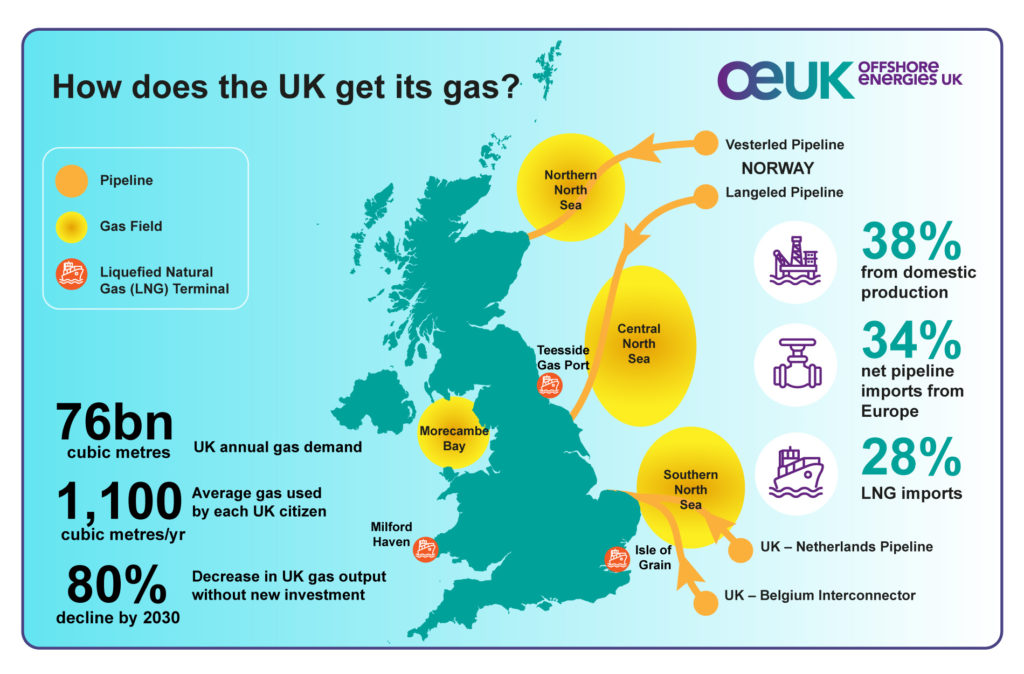The UK government’s Energy Security Strategy has been supported by Offshore Energies UK as a key step towards reducing reliance on imports, building a plan to reach net zero by 2050 and, potentially, controlling energy bills.
The plan was prompted by Putin’s attack on Ukraine, causing a tragedy for its citizens and sparking a wider energy crisis which has forced up global prices and highlighted many European countries’ reliance on Russian gas and oil – putting them at risk of shortages.
The UK’s own oil and gas resources mean it is largely protected from a supply crisis now, but lack of investment in the North Sea means production is rapidly dwindling – so our nation risks becoming increasingly dependent on imports.
OEUK has long argued that extra North Sea investment would halt the decline, so the government announcement of a licensing round for new oil and gas projects launching this summer is welcome.

The government’s accompanying statement said it: “Recognised the importance of these fuels to the transition and to our energy security, and that producing gas in the UK has a lower carbon footprint than imported from abroad.”
OEUK has been consistently pushing for a policy of supporting UK oil and gas while simultaneously expanding offshore wind, and other low-carbon energies, to provide an ever-increasing proportion of future energy needs.
Deirdre Michie, OBE, chief executive of OEUK, said: “The UK has enough proven oil and gas reserves to support the UK for at least 15 years, but we need regulatory approval to invest in the platforms, pipelines and other infrastructure needed to access it. The announcement of a new licensing round and the proposal to cut the time needed to get those approvals, by the introduction of regulatory accelerators, will help our industry carry on providing the UK with the energy it needs.

“In the longer-term the best way to take control of energy prices, as well as boost energy security, and cut emissions, is to get more of our energy from renewables. We are delighted at the proposals for a five-fold increase in offshore wind and a doubling of the ambition for low-carbon hydrogen by 2030.”
“However, this is a very ambitious plan, and we should be under no illusion about the mammoth task and costs ahead for the industry, the government and potentially for consumers too.”
The government has also announced plans to create a powerful new public body. The Future System Operator (FSO) will provide strategic oversight of the development of the UK’s energy suppliers and networks, covering both gas and electricity.
OEUK has consistently called for a greater emphasis on long-term planning and preparation in UK energy infrastructure. This is because almost all energy infrastructure takes many years to plan and construct – meaning the investment cycle is much longer than the corresponding political and electoral cycles.
Michie said: “Our industry is used to thinking in years and decades, but we need stable long-term regulatory policies, clear and predictable fiscal policies, and improved political alignment across all the countries and parties of the UK and this is the message I delivered on behalf of Offshore Energies UK at the Prime Minister’s Energy Roundtable on March 14.”
“This new strategy has the potential to create the stability in policy and planning needed to support the nation’s transition to a lower-carbon future. However, the speed and cost of the plans for transforming our energy systems is so great that we also urge political parties and policymakers across the UK to build an enduring consensus.
“This will be essential for the implementation of the government’s forthcoming energy bill – it has the potential to draw billions of pounds in investment from UK industry and so ensure that the energy systems of the future can be designed and built by UK companies and workers. “Finally, the focus now is on energy prices and security but we must not forget the even more serious threat of long-term climate change. The UK is leading the world in reducing greenhouse gas emissions and the offshore energy sector is committed to sustaining this in the months and years ahead. So, we must continue to focus on net zero and we are committed to doing so.”
Share this article
